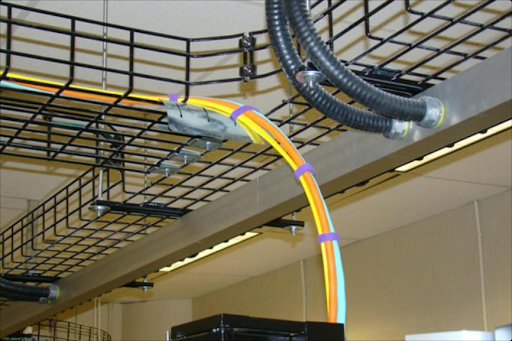FRP (Fiber Reinforced Plastic) cable trays are structural systems designed to support and manage electrical and communication cables in various industrial and commercial environments. Unlike traditional metal trays, FRP cable trays are made from a composite material consisting of fiberglass reinforcements embedded in a resin matrix—typically polyester, vinyl ester, or epoxy—which provides excellent resistance to corrosion, chemicals, and moisture.
These trays are most commonly manufactured using the pultrusion process, where continuous strands of fiberglass are pulled through a resin bath and then passed through a heated die to form and cure the tray profile. This method ensures consistent strength, dimensional accuracy, and surface finish. The result is a lightweight, non-conductive, and highly durable cable management solution suitable for harsh and demanding applications across multiple industries.
Exploring applications and uses of FRP Cable Trays
FRP cable trays are used in a wide range of applications where corrosion resistance, electrical safety, and low maintenance are critical. Their non-conductive, lightweight, and fire-retardant properties make them ideal for industries such as power generation, chemical processing, oil and gas, wastewater treatment, and marine infrastructure.
These trays effectively protect and support electrical and communication cables in both indoor and outdoor environments, especially where exposure to moisture, chemicals, or extreme temperatures would degrade conventional metal trays. They are also widely used in data centers, offshore platforms, and industrial automation setups due to their durability, easy installation, and long service life—making them a preferred choice for modern infrastructure and cable management needs.
How FRP Cable Trays manufacturers are revolutionizing with modern technological advancements?
FRP cable tray exporters are revolutionizing the industry by adopting modern technological advancements that enhance product performance, manufacturing efficiency, and customization capabilities. Through automation and precision-driven pultrusion technology, manufacturers can produce consistent, high-strength profiles with minimal material waste. Advanced resin formulations and improved fiberglass reinforcements are being used to develop trays with superior thermal stability, fire resistance, and mechanical strength.
CAD-based design tools and simulation software allow for tailored tray configurations to meet specific project demands, while real-time quality monitoring systems ensure strict adherence to global standards. Additionally, eco-friendly production practices and digital supply chain integration are enabling faster turnaround times, greater scalability, and increased reliability—positioning FRP cable trays as a smart, future-ready solution for modern infrastructure projects.
Conclusion
FRP cable trays represent a significant advancement in cable management systems, offering a combination of strength, safety, and durability that traditional materials often lack. Manufactured through precise and efficient processes like pultrusion, these trays deliver consistent quality and performance even in the most demanding environments.
Their wide applicability across various industries, from power and petrochemicals to data centers and marine infrastructure, underscores their versatility and reliability. As manufacturers continue to innovate with advanced technologies, customized solutions, and eco-friendly practices, FRP cable trays are increasingly becoming the go-to choice for modern infrastructure projects that demand long-lasting, maintenance-free, and high-performance solutions.








